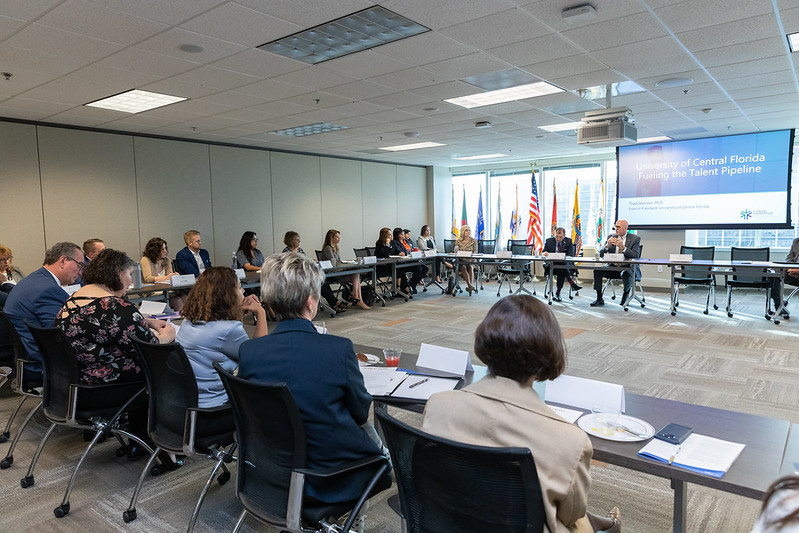Employers small and large are talking about talent. From the likes of JP Morgan Chase to IBM, many have even researched and produced reports on ways to “bridge the talent gap”. At the same time, just about everywhere you look, colleges and universities are rebranding their career services offerings and highlighting talent.
Florida International University, University of Central Florida, and University of South Florida, the member institutions of Florida Consortium are working together to help college graduates fuel the state’s high skilled talent pipeline. Recently, the Florida Consortium, initiated the Future of Talent, a regional discussion with employers and leaders from local government, education, and philanthropic organizations. The first Future of Talent convening was held in Central Florida.
Thad Seymour Ph.D., UCF Interim President, Dale Brill Ph.D., Vice President of the Foundation for Orlando’s Future, and Mr. Paul Luna, President and CEO of Helios Education Foundation helped kick off the discussion in Central Florida. The importance of partnerships and investing in the community were common themes.
Doug Heckman of EMSI University Data Solutions joined the discussion and shared regional labor market insights specific to Central Florida. He described skills clusters and how occupations are influenced by the local industries. Said another way, the skills needed, and in demand by employers, vary by region. For example, cyber-security roles in Dayton, Ohio, Seattle, Washington, or Norfolk, Virginia may have the same title and similar job description but the skills required to land and succeed in those roles are heavily influenced by regional industry needs. Given this distinct challenge, K-12 as well as colleges and universities must commit to focused partnerships with employers. They also need to use labor market data to effectively advise learners.
The Future of Talent convening in Central Florida closed with a discussion on how the Florida Consortium can and will support the Sunshine State’s talent needs and retention goals. Michael Preston, Ed.D., Executive Director of the Florida Consortium shared the consortium’s impact dashboard. He challenged the leaders in the room to see themselves as equal partners in talent development. “It’s not enough to sit back and wait for talent. It’s not enough to rely on traditional instructional or advising methods. Everyone has a role to play” said Preston.
In closing, attendees learned that homegrown talent is less expensive to cultivate and yet it is the key to effectively addressing the state’s demand for high skilled workers. When graduates stay and work in their hometowns it increases the talent density in their city and fosters organic prosperity.
The Future of Talent discussion heads to South Florida on February 11th, 2020



